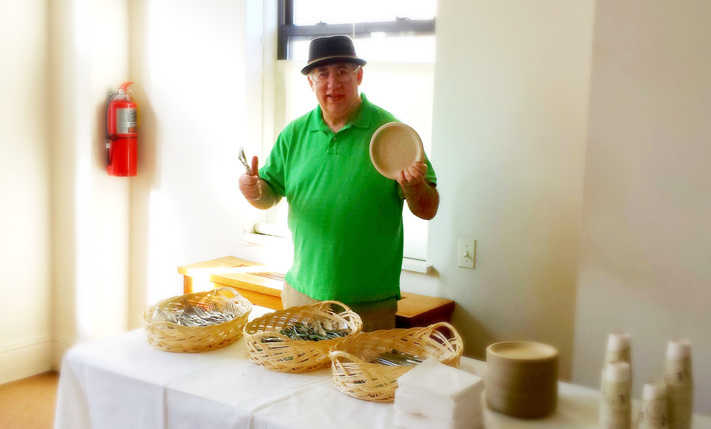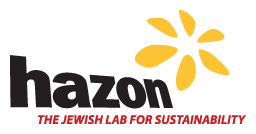|
 |
 |
|
We work to create a healthier and more sustainable Jewish
community, and a healthier and more sustainable world for
all. |
 |
|
|
|
 May
2015 | Iyar 5775 May
2015 | Iyar 5775
|
|
In this issue |
 |
| Creating
Sustainable Kiddush |
 |
| Calendar |
 |
| ReSources
You Can ReUse! |
 |
| |
 |
 |
|
Mission |
 |
|
The Jewish Greening Fellowship, a program of Hazon, aims to
cultivate environmental change leadership, reduce the
environmental impacts of Jewish organizations in the New York
area and generate meaningful responses to global climate change
while strengthening Jewish life. |
 |
|
 |
 |
 |
|
Raise
a Glass to Greening: Creating a Sustainable
Kiddush |
|
by Hody Nemes, Manager of Greening and Climate
Intiatives |
 |
|
|
|
|
 |
|
Greening
often happens in supply closets. On roofs. In the boiler room. Out of
sight.
To bring greening out of the shadows, it’s
important to make it a visible part of your programming.
For synagogues, weekly kiddushes offer the perfect
opportunity to highlight greening work already underway and
demonstrate that greening is a Jewish value. Kiddush, which means
sanctification, was intended as a way to sanctify Shabbat and remind
us to take a rest from our workday labors and enjoy the beauty of
creation. But what could be a better way to sanctify the day than
creating a healthier, less wasteful kiddush?
Organizing a sustainable kiddush is an ideal first step
for synagogues that have little experience in greening: it’s
easier than a facility upgrade and requires less upfront effort
and investment... but it can help the congregation get into better
habits and build momentum for additional projects. For synagogues
already steeped in greening, the kiddush – with its large,
captive audience – offers an excellent opportunity to raise the
profile of existing greening measures.
Hosting a sustainable kiddush also provides a way to
pilot changes in operations, testing their feasibility and
congregants’ opinions as a springboard for broader change. For
example, if composting one week’s kiddush waste proves to be
low-cost, logistically straightforward, and popular among
congregants, the green team can work to make it a permanent fixture
of kiddush. But taking the first, easy step is crucial.
While schools, JCCs, and social service agencies don't
hold kiddushes, they can green any of their weekly programs using the
same principles.
Numerous JGF synagogues have held green kiddushes. Last
year, Congregation Ansche Chesed’s executive director, Josh
Hanft, arranged for the city to begin picking up composting
from the weekly kiddush, and switched from plastic to reusable metal
cutlery, which drastically reduced the amount of trash created at
kiddush. Congregants welcomed the transformation: During Passover,
when the congregation temporarily stopped composting, congregants
clamored for its return. (Email Josh –
JHanft@anschechesed.org – for more further guidance.)
|
|
 JGF Fellow Josh Hanft shows off the reusable cutlery used at
Ansche Chesed’s kiddush.
JGF Fellow Josh Hanft shows off the reusable cutlery used at
Ansche Chesed’s kiddush.
But you don't have to focus your kiddush greening efforts on waste
alone. At Kane Street Synagogue, congregants decided to make
healthier kiddushes; they cooked fresh, delicious dishes for the
kiddush in the synagogue kitchen. Led by Jewish Greening Fellow Rabbi
Valerie Lieber, they also found a fantastic opportunity to empower
children in the kiddush greening process: students in Kane Street's
Hebrew school learned how to sort waste between garbage, recycling,
and compost, and in turn stood by the receptacles and trained
adults.
To green your kiddush, or other weekly program,
consider:
-
Serving locally-grown vegetarian food to reduce your
carbon footprint, prevent the mistreatment of animals, and
promote better health.
-
Arranging composting through a local farmer’s
market, CSA, commercial hauler, or city collection program.
See NYC’s Compost Project for assistance.
-
Filling the kiddush cup with organic grape juice or
wine.
-
Buying reusable tablecloths, reusable water jugs,
and reusable or compostable plates to reduce plastic use. Also
consider improving your recycling program and installing clearly
marked waste-sorting stations.
-
Cutting out soda. Instead serve fruit juice or fair
trade coffee and tea.
-
Above all, educate! Make an announcement before
Kiddush, create table tents and resource sheets available
explaining the kiddush, and ask the rabbi to devote his/her
sermon to greening.
Visit Hazon’s Shmita webpage for educational ideas.
For other ideas, explore the
Riverdale Y’s Green Kiddush Guide or
Hazon’s Sustainable Shabbat guide.
When should you hold a green kiddush? Spring and summer
are ideal, since local produce is readily available. Shabbat Behar,
on May 15-16, or a shabbat shortly thereafter, offer an opportunity
to celebrate the Shmita year, which the Torah describes as a time to
let the land rest and to forgive debts – a year-long Shabbat
for the earth and its inhabitants. The parsha (weekly Torah reading)
of Behar presents one of the Torah’s passages on Shmita. Last
year, communities all around the country marked the period around
Shabbat Behar with Shmita-themed events. We read about Shmita
again in the portion Vayelech on August 15th.
Let us know if you are planning an event.
|
 |
 |
 |
 |
 |
|
Calendar |
|
|
|
From Uncertainty to Action: What You Can Do About
Climate Change
Hebrew College, Newton, Massachusetts
Sunday, May 17, 2015, 3 pm - 7
pm
This conference seeks to convene aspiring and existing
Jewish climate change activists. Participants will
network with others concerned about the planet, learn
about Jewish aspects of climate change and ways to
resolve spiritual anxieties about it, and learn about
organizations working to address it. The conference is
being organized by the Jewish Climate Action Network and
Hebrew College, in collaboration with Hazon.
JGF Field Trip: Wild Edibles Tour and
Stone Barns Center for Food & Agriculture
Mount Pleasant, Westchester, New York
Wednesday, May 20, 2015, 9:30 am - 12:30
pm
On the Jewish Greening Fellowship's next field trip
we'll explore cutting-edge sustainable agricultural
techniques at Stone Barns farm and learn how to teach
your members, educators, and kids (in your school, camp,
or Hebrew school) about the wild foods growing in plain
sight with expert forager “Wildman” Steve
Brill. Email
Hody for further information.
Shmita Festival
Governor’s Island
Sunday, August 9, 2015
Save the Date! Head across the water to
Governor’s Island for Shmita-themed celebration in
collaboration with Art Kibbutz. Stay tuned for
details.
|
|
|
 |
 |
 |
|
ReSources You Can ReUse! |
 |
|
|
 |
|
|
 |
|
|
 |
| |
 |
 |
|
|
 |
 |
|
|
 |
|
|
 |
|
 |
|

|
